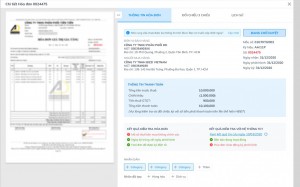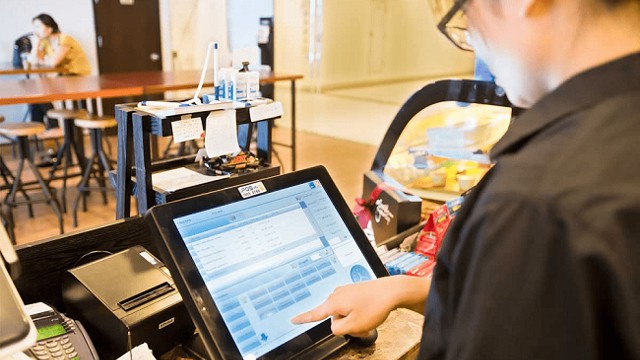According to VCCI, many regulations in the draft decree amending and supplementing a number of articles of Decree 123/2020/ND-CP on invoices and documents (hereinafter referred to as the Draft) may give rise to additional issues. procedures, costs, causing difficulties for business operations, even increasing risks for businesses when issuing invoices.
After recording the opinions of many businesses, the Vietnam Confederation of Commerce and Industry (VCCI) has just responded to Official Dispatch No. 9206/BTC-TCT of the Ministry of Finance on requesting comments on the draft Resolution. Decision to amend and supplement a number of articles of Decree 123/2020/ND-CP regulating invoices and documents (Decree 123).

Prepare invoices in case of temporary import for re-export, temporary export for re-import, export of goods in the form of loan, lending and receiving refund of goods
In this document, VCCI clearly states the first shortcoming regarding invoicing in cases of temporary import for re-export, temporary export for re-import, export of goods in the form of loan, lending and receiving return of goods.
Article 1.2 of the draft (amended Article 4.1 of Decree 123/2020/ND-CP) stipulates that enterprises must issue tax invoices in the following cases: temporary export for re-import, temporary import for re-export of raw materials and finished products , machines, tools, instruments; Exporting goods in the form of lending, lending or receiving return of goods.
However, VCCI believes that this regulation is inappropriate according to businesses' feedback.
Specifically, when performing the above activities, businesses must carry out customs procedures and issue commercial invoices in accordance with regulations. This activity is strictly controlled by customs authorities according to customs laws.
At the same time, this activity is not a sales or service activity, not intended to generate profits or revenue in the Vietnamese market, but only to support export production activities.
"Therefore, the requirement to issue additional domestic tax invoices will create additional administrative procedures and increase the business's human resources," VCCI assessed.
Therefore, VCCI requested the drafting agency to remove this regulation.
Time of invoicing for exported goods
Article 1.5.a of the draft (amended Article 9.1 of Decree 123/2020/ND-CP) stipulates that the time of invoice issuance in case of export of goods is no more than 24 hours from the time the customs authority confirms Complete customs procedures.
However, according to businesses' feedback, VCCI believes that a hard regulation on when to issue invoices will cause difficulties for businesses' invoicing departments because the time may not coincide with administrative working hours, causing problems. physical pressure in actual deployment.
In addition, this regulation is not suitable for priority businesses and partners of priority businesses because customs law allows these businesses to complete customs procedures after 30 days from the time of export. imports of goods.
Therefore, VCCI requested the drafting agency to amend the direction to stipulate a time limit of 01 day from completion of procedures; Add exception for priority businesses.
VCCI also made similar comments about the 24-hour time limit for digital signing in Article 1.6.d of the Draft (amended Article 10.9 of Decree 123/2020/ND-CP).

Issue invoices for each purchase with retail commercial businesses
Article 1.5.b of the draft (amending Article 9.4.g of Decree 123/2020/ND-CP) removes the provisions in Article 9.4.g of Decree 123/2020/ND-CP, meaning that business establishments Retail trade and food service businesses following the system model are not allowed to issue invoices at the end of the day, but must issue invoices for each purchase from a cash register with an electronic data transfer connection to the tax authority.
However, according to businesses' feedback, VCCI believes that this regulation will greatly increase costs for businesses in initial investment, system maintenance, and data storage. This will create great pressure on the retail trade and chain food service businesses.
Send taxi invoice data to the tax authority
Article 1.5.b of the draft (amending Article 9.4 of Decree 123/2020/ND-CP) regulates the preparation of invoices for taxi passenger transport businesses using billing software.
According to this regulation, businesses transporting passengers by taxi that use billing software must send taxi invoice data to the tax authority after each trip.
However, according to businesses, this regulation may lead to some difficulties in the actual implementation process, for example:
- Taxi companies' software upgrade costs increased.
- Taxi drivers forget/have difficulty performing operations, leading to traffic jams...
- Businesses can be fined for transferring data at the wrong time.
Show identification code on invoice
According to the draft revised Decree, Article 1.6b (amending Article 10.5 of Decree 123/2020/ND-CP) stipulates that the invoice must show the buyer's identification number.
According to businesses, this regulation seems to be unfeasible, because requiring buyers to declare information about identification numbers will be a blocking point, making buyers not want to get invoices because they do not want to declare. disclose this information.
In fact, many people are still unfamiliar with providing identification numbers to agencies, organizations and businesses. Requiring buyers to declare their identification number on the invoice can make them feel shy, or even unwilling to get the invoice. This will make it difficult for businesses to carry out administrative, accounting, tax procedures, etc.
In addition, VCCI believes that the seller does not have a mechanism to confirm whether the identification code provided by the buyer is accurate or not, and meets the conditions of "identification code according to legal regulations and electronic authentication". "or not" to show on the invoice.
According to regulations, the identification number must be electronically authenticated before being shown on the invoice. However, currently, there is no mechanism to electronically authenticate identification numbers for all subjects. This will pose a risk to the business in case the identification number provided by the buyer is incorrect.
Commercial discount invoice
Draft Amended Decree, Draft Article 1.6.c (amended Article 10.6.đ Decree 123/2020/ND-CP) has added regulations on making adjusted invoices for cases of commercial discounts created at the end of the discount program. However, this regulation has received many feedback from businesses and experts about its feasibility and effectiveness.
According to businesses, this regulation will create a huge amount of work
Specifically, this regulation requires businesses to issue an adjusted invoice for each sold invoice in case the customer meets the discount conditions. This will cause a number of difficulties for businesses, including:
- Increase the workload of invoicing, adjusting invoices, and storing invoices.
- Causes difficulty in managing and comparing invoices.
- Increase costs for businesses.
In addition, this regulation is also not consistent with reality
In many cases, businesses can only identify customers who satisfy discount conditions at the end of the program, while invoices may arise in many declaration periods. Making adjustment invoices in this case will cause differences between accounting books and tax declaration data, making control difficult.
From the above analysis, VCCI recommends that the drafting agency consider adding principles allowing businesses to issue a discounted invoice (not an adjusted invoice) and attach a list.
Processing electronic invoices in case of returning goods
Article 1.13 of the draft (amending Article 19.6.d of Decree 123/2020/ND-CP) regulates the processing of electronic invoices in case of returning goods. However, this regulation has received many feedback from businesses and experts about its feasibility and effectiveness.
According to businesses, this regulation causes difficulties for businesses
Specifically, this regulation requires businesses to issue an adjusted invoice in case the buyer returns part of the goods.
In case the buyer is a distributor, when returning goods, a shipping invoice is required while the seller receives the goods and counts the quantity of goods actually returned before issuing a return invoice. This will delay the preparation of adjusted invoices, making it difficult for businesses to declare taxes.
From the above analysis, VCCI recommends that the drafting agency specifically review the declaration of tax on adjusted invoices in the case of returning goods at the adjusted invoice period, thereby allowing it to be declared in the adjusted invoice period. returns arise.
Introducing the solution of automatically processing input invoices and automatic smart 3-way comparison
Currently, many businesses have converted from using paper invoices to electronic invoices, following the regulations of Decree 123/2020/ND-CP and Circular 78/2021/TT-BTC. Recognizing the necessity of accounting work in daily processing, Bizzi has developed a solution to automate information related to input invoices and perform intelligent 3-way reconciliation. This solution is equipped with many features and utilities to help solve problems related to electronic invoice management effectively.

Automatically process input invoices
- Receive invoices from NCC and automatically analyze and process invoices to ensure accuracy and validity.
- Supports automatic approval and warning of incorrect invoices to NCC when there are invalid invoices via email.
- Check invoice information and seller activity status to ensure the validity and legality of the invoice.
- Synchronize invoices with the system of the General Department of Taxation and third party invoice issuers such as Electricity, Water, Transportation,...
- Automatically extract invoice data according to standard Excel file formats for each type of accounting software.
- All invoices are stored and managed centrally on a system that supports easy searching.
Automatic intelligent 3-dimensional comparison
- Smart 3-way comparison between invoices - orders - warehouse receipts with more accuracy than 99%.
- Handle all reconciliation cases on the system: 1PO – 1INV – 1GR; 1PO – nINV – nGR; nPO – 1INV – nGR; nPO – nINV – nGR
- Detect deviations quickly and improve data accuracy.
- Automatically confirm 3-way comparison of each product line accurately and push information through the customer's ERP system.
- Automatically get PO number from invoice/email from supplier/invoice file.
- Support creating invoices and comparing goods for farmers from templates.
- Automatically convert units of goods and manage goods intelligently.
B-Invoice – Electronic invoice solution fully meets the requirements
According to the provisions of Article 89 of the Law on Tax Administration dated June 13, 2019, Article 11 of Decree 123/2020/ND-CP, Article 1 of Decree No. 41/2022/ND-CP and Article 8 of Circular No. 78/2021 /TT-BTC, regulates the use of electronic invoices created from cash registers with tax authority codes.
Bizzi Vietnam now has a solution B-Invoice electronic invoice – Double the convenience, double the optimization. Thereby, Bizzi will support customers in using electronic invoices created from the cash register.

Why should businesses switch to using B-Invoice?
- Recognized by the General Department of Taxation, fully meeting the requirements and operations according to Decree 123/2020/ND-CP and Circular 78/2021/TT-BTC
- The best cost when customers use both output and input invoices
- Easy integration and customization to your needs
- Warehouse of diverse invoice templates, designed according to needs
- Store invoices for 10 years
- Automatically update new versions when there are changes in operations as required by Tax
- Security system according to ISO 27001 standard
Follow Bizzi to quickly receive the latest information:
- Facebook: https://www.facebook.com/bizzivietnam
- Linkedin: https://www.linkedin.com/company/bizzi-vietnam/
- Youtube: https://www.youtube.com/@bizzivietnam


